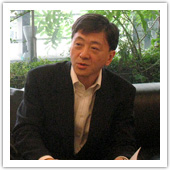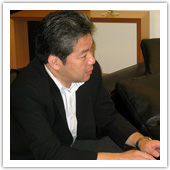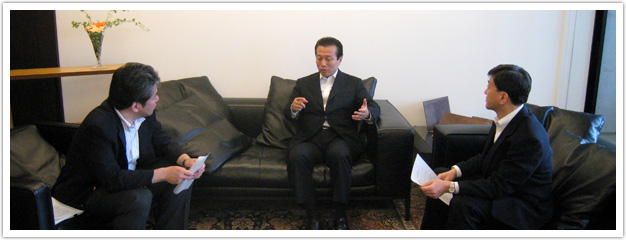RIETI held a series of roundtable discussions in May and June, each time inviting a business leader with proven expertise for discussion with RIETI Chairman Atsushi Nakajima and a RIETI researcher on post-disaster reconstruction and challenges ahead.
Pasona Group CEO Yasuyuki Nambu joined RIETI Chairman Atsushi Nakajima and RIETI Senior Fellow Kotaro Tsuru for our third roundtable discussion.
 Atsushi Nakajima (RIETI Chairman):
Atsushi Nakajima (RIETI Chairman):
Today I would like to hear your views concerning employment issues relating to reconstruction following the earthquake and tsunami in eastern Japan.
The most important issue with employment is to change attitudes concerning regular and non-regular employment
 Yasuyuki Nambu (Pasona Group CEO):
Yasuyuki Nambu (Pasona Group CEO):
I feel that government policy to tackle employment issues until now has been a case of repeatedly trying to turn cubes on a tray into spheres one by one in order to make them roll. The cubes are the various regulations that always exist, which are then rounded through deregulation and allowed to roll. Deregulating things, coming up with various ideas, providing subsidies, and so on in such a way as to meet the demands of the times has been the constant pattern for the last 10, 20, or 30 years. In other words, it's been a case of just making the top part roll.
The tray, meanwhile, represents attitudes to work, and these make up the basic infrastructure of society. However, this part has never been touched. Be it the oil shocks or the recent earthquake and tsunami, all that has been done is address the specific needs of the time, for example, improve employment conditions at small and medium enterprises or help people who have been let go by large corporations to find new jobs. In other words, the cubes on the tray have just been rounded and allowed to roll.
I believe that unless major surgery is performed on this tray, employment-related problems will never be solved. In other words, attitudes need to be changed and social infrastructure transformed. The most important change to make is with attitudes concerning regular and non-regular employment.
While regular employees are described as regular, the rest, i.e. non-regular employees, are not. It's as though they are not human beings, and the distinction has an air of discrimination to it. To begin with, people need to acknowledge that there are various types of employment. They need to accept that there are different ways of working, for example, that someone can be a regular company employee even if they only work four hours per day, eight hours per day, or just one day a month. At the same time, a proper social infrastructure must be established for those people who work four hours per day. In other words, various changes need to be made, to pensions, social insurance, education-related matters, and so on. Attitudes need to be altered, and the social infrastructure needs to be improved. In short, instead of worrying about how to change the cubes into spheres, the tray itself needs to be flipped over.
Nakajima:So you mean that the ways of working need to be more like those overseas, where the abilities of individuals count for more than their employment status and whereby the labor market is highly liquid as a reflection of that. In Japan, however, the labor market is still rigid. I don't think there is enough labor market liquidity to cope with specialization by individuals.
Improve social infrastructure from the viewpoints of working people
Nambu:That is due to problems with the social infrastructure. In other words, policies and mechanisms for establishing such a labor market have not been established. Who is responsible for establishing such social infrastructure? The answer is the government and public servants. One could go so far as to say that the government and public servants view only those who work full time at companies as constituting the labor force.
Rather than building a social infrastructure from the perspective of working people, they only seem to think about how to get people to work for companies so that they can collect taxes from them. They seem to think that the way to increase GDP and make the nation stronger is to call those who work from 9 a.m. to 5:30 p.m. regular workers and call everyone else non-regular workers.
However, both men and women may find themselves having to take care of elderly relatives, and some may want to have a second or third child. Some women want to have three children and carry on working. Even if they take a year of childcare leave, the child will still get sick after that, so I think we need to create a society in which people can work and bring up children properly at the same time.
Because the government and public servants view anyone unable to work from 9 a.m. to 5:30 p.m. as a non-regular worker, such people have little support from various types of social infrastructure, such as pensions and insurance. While they provide subsidies for regular workers, they do nothing of the sort for non-regular workers. On the contrary, the social infrastructure for them is restricted.
 Kotaro Tsuru (RIETI Senior Fellow):
Kotaro Tsuru (RIETI Senior Fellow):
We've actually just published a book on the issue of non-regular employment (Kotaro Tsuru, Takeo Higuchi, Yuichiro Mizumachi eds., Hiseiki Koyou Kaikaku [Reforming Non-regular Employment], Nippon Hyoronsha). The labor market is split into two separate structures, and various systems and policies have been employed to try and bridge the gap between the two. Even so, hardly anything has changed. And on the subject of providing stable employment, all that has been discussed is things like banning haken work, whereby people work for companies indirectly through employment agencies.
Nambu:
I think that there are two types of haken (temporary staffing) workers. The first type of haken workers are housewives who used to only be able to work part time for 800 or 900 yen per hour, but who can earn 1,600 or 2,000 or 2,500 yen per hour by being staffed to offices under the haken system. The second type are workers in the manufacturing sector who used to be described as working for subcontractors but are now described as haken workers. This situation needs to be changed.
People ask me whether our company is a haken firm, but our haken workers are treated in the same way as regular workers. They are enrolled in social insurance, and they still receive their salaries even if the company they work at goes under. They also receive fringe benefits and education and training. However, the haken system in the manufacturing sector, which grew out of the practice of subcontracting, is different. The systems of subcontracting and maintaining subsidiaries and sub-subsidiaries represent the traditional nature of the Japanese manufacturing industry, and have existed since the Edo Period. These systems were described in Japan as "subcontracting in disguise," and all of a sudden haken legislation came into effect and companies could no longer employ people in this way for longer than three years.
Another problem is that almost all the lawmakers and other politicians who run the country and in whom the people entrust their lives have not studied this structural difference. They just say things are bad without studying the current problems in society. Politicians and public servants somehow possess a mentality under which they only see the people as a workforce. The people are always the victims of legislation.
Tsuru:
Although various labor policies have been implemented, such as expanding eligibility for subsidies for companies that are trying to avoid laying off workers, there are question marks over whether, when taken together, they constitute a single system. Although emergency measures to suit the times may sometimes be necessary, there has been criticism of mismatches in employment.
With this recent disaster, demand will not recover in a cyclical fashion, so these employment mismatches could develop into structural unemployment. I wonder whether the current policy of pouring money into emergency measures will really be enough.
A change in attitudes and deregulation are also necessary for dealing with the issue of employment for the victims in Tohoku
Nakajima:
Although many people in Tohoku work in primary industries, some of them may not be able to return to their previous jobs, so employment mismatches are a possibility. In addition, some older people can be expected to find it difficult to change jobs.
Nambu:
The social infrastructure should be transformed quickly to allow people like that to work three or four days a week at hours that are convenient for them with peace of mind. Even before the earthquake, many people only did fishing or farm work part time, spending the rest of their time doing other jobs such as working at insurance companies. Actually, as much as 90% of farmers might have had other jobs.
In Japan, however, hardly any companies allow their employees to take other jobs, and the social infrastructure is based on the premise of full-time employment. The national government has failed to create a society in which individuals are not tied to companies but are free to choose their own work. Responsibility for managing and supervising employment lies with the government, so they are always thinking about where people can be employed. That's why people who can work full time, i.e. five days a week, are described as regular employees. They only think in terms of big corporations. In other words, it's a case of big corporation disease.
Nakajima:
You mean that even though emergency employment measures are being implemented in Tohoku, what is of fundamental importance is how to quickly reinvigorate the economy, as this is what will ultimately generate employment?
Nambu:
Stimulating the economy is obviously important, but I still think policies that reflect a change in attitudes need to be introduced. If a social infrastructure had been established that allowed freeters (people who move from part-time job to part-time job) to feel pride and achieve their dreams and ambitions, I think that a mechanism of insurance and pensions of a minimum standard would have been in place even in the case of a disaster like this one. Emergency measures aimed at developing industry would have then been implemented on top of that.
Nakajima:
There are discussions on how to use this disaster as an opportunity to develop more advanced industries in Tohoku, but that will require human resources with higher-level skills, so there's the issue of education, including vocational training. I therefore feel that it's essential to develop human resources--including through vocational training--that can meet this need. Do you feel that education is being properly coordinated?
Nambu:
In the area of training, people in Japan rely on their companies to provide them with the training they need to function as members of society. If human resources for new industries are to be developed, society as a whole needs to improve human resources development.
Although the disaster-affected areas may be negatively affected by radiation and salt damage, many people still want to remain in their home town. However, rather than stay in an area that has been almost completely destroyed, I think such people need to leave their prefecture temporarily to work elsewhere and gain experience. To that end, for example, a policy of promoting exclaves could be implemented whereby cities could be created outside the affected prefectures. Partner cities could also be established to handle administrative tasks such as residency registration. Training and internship programs could also be offered. At the moment, the prevailing view is that everyone should remain in their home cities or towns, but a mechanism must be established that allows people to leave their prefecture and then return in the future.
Nakajima:
So a proper framework for ensuring employment mobility needs to be established.
Tsuru:
Right now in the disaster-affected areas there's this notion of "cash for work." The system involves local governments helping people there who have lost their jobs due to the disaster to get back on their feet by employing them temporarily and paying them in cash.
On the other hand, people with specialist skills, such as engineers, will be better able to apply their abilities by moving to a different area. They have that choice. The mismatch problem is easier to solve if you are flexible about where you live and the kind of work you do, so at a time like this, it is all the more important to make the labor market more liquid.
In fact, a trend has begun to introduce human resources with housing and employment as a set. However, private-sector employment placement and human resources dispatch (haken) are still governed by various regulations, and the attitude from above, namely, that such practices result in the exploitation of workers and are basically bad, remains unchanged. Although realities are changing, the legal framework and the basic attitude of the government are not. After a proper safety net, including social insurance and so on, has been established, regulations that can be eased should be eased. The government ought to think about labor mobility and the labor market a little bit more.
Nambu:
I agree.

A system of education needs to be established to develop human resources with a global outlook who can succeed in any company
Nakajima:
Mr. Nambu, you are also focusing on human resources development, and going forward, how do you think Japan should develop its human resources?
Nambu:
There are various definitions of education. Obviously, there's the education provided by high schools, universities, companies, and so on, but there are also wider definitions, encompassing social education, for example. Education is an extremely broad term.
What I can say is that if I were the education minister, I would get rid of entrance examinations. I would establish standards that give everyone the freedom to study what they want and skip years and that enable companies to hire them.
The industrial structure of society and the core businesses of companies are constantly changing, and the fact is that education has trouble keeping pace. I therefore believe that a system of education should be established that creates human resources that can succeed at any company. Industries emerge naturally to meet the changing needs of society, so legislation should be established, deregulation implemented, and human resources developed to prevent the emergence of new industries being nipped in the bud.
Tsuru:
At the moment, students have to begin the job-hunting process in their third year of college. This is a time when they should be going overseas to study in order to think thoroughly about their futures and freely develop their ideas, but apparently more and more students are hesitating to go and study abroad. With global competition set to become increasingly fierce, it is necessary to think hard about how to develop global human resources to support Japan in the future.
Nambu:
I think that's a very good point. At the moment, the old systems of seniority-based promotions and lifetime employment mean that everyone graduates from university at the end of March and immediately start their new jobs. However, I think Japan will also start to adopt ideas similar to ones seen overseas such as gap years and the Teach For America program. At the very least, therefore, legislation should be established or revised to enable free thinking to shape the way things happen.
I think that employment in Tohoku is an extremely difficult issue, with problems such as fishing concessions, for example. Another problem is that so many people there are elderly. A system of agriculture based on the Trans-Pacific Partnership (TPP) could be established, for example, but whether the government will do that or not remains uncertain. And if the mayors of cities and towns take the initiative, to what extent will their citizens support it?
Nakajima:
Thank you for sharing your thoughts with us.
Everyone:
Thank you.

